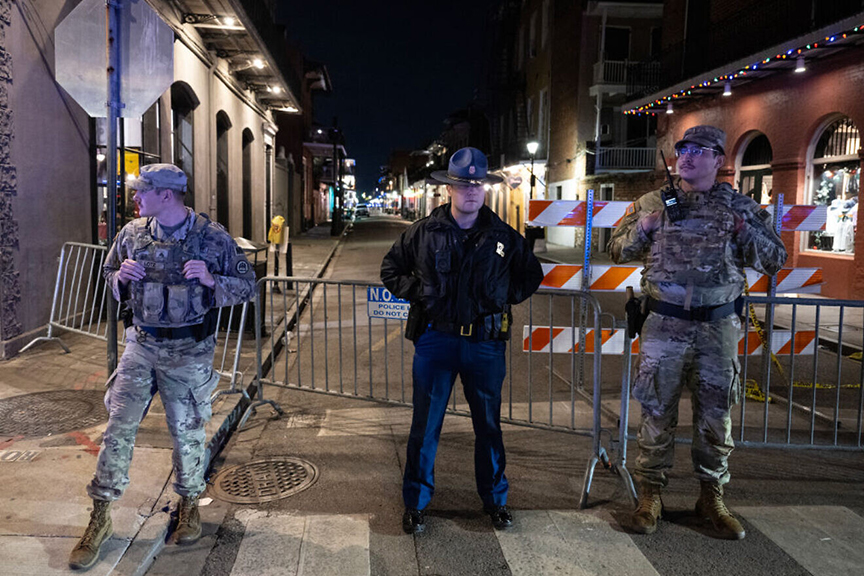Father of Israeli wounded in New Orleans: ‘Part of his skull is missing’

National Guardsmen and a police officer at a blocked off street, a block from Bourbon Street in New Orleans after an ISIS supporter killed 14 people and wounded at least 35 others early on Jan. 1, 2025. Photo by Andrew Caballero-Reynolds/AFP via Getty Images.
From JNS and SJL reports
In an interview, Israeli Hagai Levin described the impact of the injuries sustained by his son Adi, a member of the IDF Armored Corps, during the New Year’s Day attack in New Orleans by an ISIS-inspired terrorist who murdered 14 people and wounded dozens of others. The terrorist also died.
“His state fluctuates, but I’m optimistic. I’ll bring my son home. His life will change—he’ll have metal rods in his arms and legs, an open head wound and part of his skull is missing,” Hagai said.
“There are still injuries we’ll fully understand only in a month when we begin the head rehabilitation process. But he’ll return to us, and for that, we’re moving our home from the Golan Heights to Tel Aviv to be closer to Tel HaShomer Hospital [Sheba Medical Center in Ramat Gan].”
Adi remains bedridden, as does his friend and fellow IDF soldier Y. (who chooses to remain anonymous out of safety concerns). “I miss everyone terribly and am deeply grateful to the Jewish community here for their support,” Y. said. Both Israelis are 23.
The pair’s visit to New Orleans was part of a planned three-month road trip that took them from Nebraska to Los Angeles and then on to Texas and Louisiana, after two tours of reserve duty in Gaza and one in Lebanon. They did not make it to their planned destination of Florida.
Having seen the security camera video of the attack, Hagai said that the vehicle driven by Shamsud-Din Jabbar “hit Adi head-on, crushing his legs and head, dragging him along the road, and pushing his friend to the side.”
At first, Adi was listed as missing, until the local Chabad located him at the hospital and identified him through his credit cards. His phone and passport are still missing. The Jewish community also arranged for an apartment near the hospital for family members.
According to Rabbi Mendel Rivkin from Chabad of Louisiana, Chabad and the Jewish Federation of Greater New Orleans are partnering to assist the Israelis and their families, including fundraising for their needs. “Food is brought to the hospital several times a day. Streams of people from the Jewish community visit the patients and their families. Visitation rotation has been set up and the support has been amazing.”
Chabad in Metairie is holding a blood drive on Jan. 13 to help those injured in the attack, and the drive is dedicated in honor of the two Israelis.
While praising the hospital as operating at an “incredible standard” and saying that “we are receiving exceptional care,” Hagai said that “despite their travel insurance, a single day of hospitalization here costs roughly the equivalent of the entire annual budget of Israel’s healthcare system combined. The expenses will exceed a million dollars.
“We are facing a long recovery ahead. He’s spent two weeks in the emergency room and will need several months in rehabilitation with complex surgeries. We won’t return to Israel before April.” Hagai said.
The family hopes Adi and Y. will be classified as victims of a terror attack, opening up resources from the Israeli government.
In the interview with Ynet, Hagai said Adi has lapses of concentration and often falls into deep sleep, but he surprised him a couple days ago by asking “how did he do?” It turned out Adi was referring to Israeli NBA player Deni Avdija, whose Portland Trail Blazers had defeated the New Orleans Pelicans in New Orleans on Jan. 8, 119-100. For the record, Avdija had 26 points in just 27 minutes to lead all scorers, with six rebounds and two assists.
In remarks to Ynet, Israeli Consul to the Southwest United States Elad Shoshan linked the attack to the extreme anti-Israel rhetoric that has been seen in demonstrations throughout the world, including in New Orleans, and in Houston, where the attacker is from. “The rhetoric of a ‘global intifada’ has grown more extreme, words turned into actions and those actions evolved into acts of terror targeting innocent people—precisely like the attack in New Orleans.”
Yaakov Selevan, deputy governor of the Golan Regional Council, sent a video message to New Orleans saying they were “shocked and devastated by the horrible, murderous terror attack” on New Year’s Day. “This is not just an attack on our joint values of freedom and democracy, but also we feel a blood connection” since Adi is from that area.
Selevan thanked the New Orleans community for “embracing our wounded resident, and we pray for the full recovery of all of the wounded.”
His region has suffered over 2,000 drone and missile attacks from Lebanon, Syria, Iran and Iraq in the past few months.
South Florida Friends
Among the injured was a Jewish student from south Florida. Steele Idelson, 19, was visiting New Orleans with her friend, Elle Eisele, a student at the University of Georgia. The teens played soccer together at Canterbury School in Fort Meyers, Fla., where they were among the first middle school students to play for the varsity team, and both would become team captains.
Idelson is the granddaughter of former Lee and Charlotte Counties Jewish Federation President Charles Idelson. On Jan. 5, he posted a photo of his granddaughter reunited with her friend, holding hands in adjoining beds in the hospital.
Idelson attends San Diego State University.
(Updated Jan. 13 with Selevan’s remarks)



